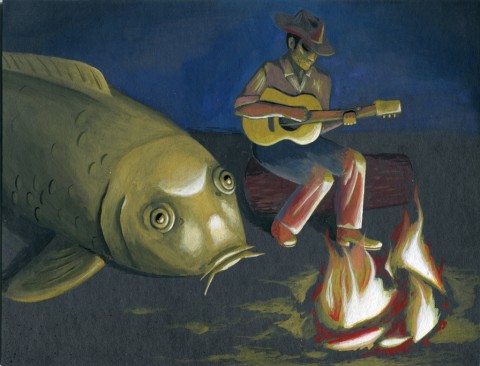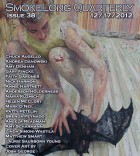Once upon a time, in a small village in Japan, there lived a samurai named Yoshida. Yoshida ate rice with a fork, smoked cigarillos, and rolled around in the dirt to bathe. He called this a Cowboy Bath. He was known around the village for his knowledge of the American West and collected all the bits and pieces of cowboy wisdom he could find. His home was covered in American artifacts: rifles, a picture of John Wayne, tumbleweed, a stuffed beaver wearing an Indian headdress, and, clutched in the beaver’s paw, a pebble, a bullet.
In the mornings he meditated in front of the beaver. He often asked it questions. He wanted to understand how the cowboys harnessed incredible power from string, swirling it around and using it to catch beasts. He wanted to know more about Steam Indians and where they came from and where they were going. One time he asked the beaver what he thought of the cowboys. The pebble in its paw turned pink, burned into a darker and darker red, and then the beaver’s headdress burst into flame. After that, Yoshida threw the beaver into a lake. The next day he bought a movie projector.
The first time he watched an American Western on a movie reel, all the neurons in his brain lit up so brightly that his eyes glowed. Then the lights flickered a few times and went out. His brain malfunctioned. The inside of his head went completely dark until a few emergency neurons clicked on, shining around the empty space and surveying the damage.
When he watched the Westerns, he listened to the characters speak and mouthed their words in the dark. The accent was so foreign and rough, unlike anything he had ever heard before. He liked the way the words felt when he said them. The way they rolled off his tongue like tumbleweed. The way his mouth felt dry like he had just ridden a horse through a great wall of dust.
He longed for a horse, so he set out to make one.
Yoshida began breeding oversize koi fish, stuffed handfuls of hormones down their throats and threw them back into his pond. They got so fat that their diet of algae could not sustain them. They became carnivorous.
Yoshida started feeding them mice, tossing them in the pond like a porpoise trainer. Then the koi got even fatter and Yoshida threw stray dogs and cats into the pond and watched the koi fins rise out of the water, heading straight for the frantic animals. Eventually, Yoshida used a crane to lift the manatees. A manatee swung about and moved its flippers back and forth and stared at Yoshida with those deep sad eyes, and Yoshida said, “Don’t mess with Texas,” and then dropped it into the water.
He was doing this to try to speed up the evolutionary process. He wanted the koi to sprout legs, so he could ride one out of town and find a pasture. Let the big fella munch on some grass. Set himself down by a campfire under the stars.
In this dream, he wrote cowboy poetry and made cowboy coffee. He took out his cowboy guitar and sung twangy cowboy songs to the broad sleeping head of the koi fish. He didn’t just want to sing with twang, he wanted to do everything with twang. He wanted to have twang and be twang.
“Don’t mess with Texas,” was one of his favorite sayings and he had not the slightest fudge of a clue what it meant. He gathered that it was some type of a mantra that Texas people repeated, something they said to ward off the evil spirits. So Yoshida said it too.
If he was about to eat a live octopus whole, he eyed it warningly, snapped his chopsticks at it, and said, “Don’t mess with Texas.” Looking at a body at an open casket funeral, he leaned in close and whispered, “Don’t mess with Texas.” At the side of the pond as he poked the super-size koi fish with a long pole, he would say, interchangeably, “Get along little dogies” and “Don’t mess with Texas.”
He warned about Texas particularly often to the largest koi, whose name was Walt, or Big Walt, or Ferocious Walt. Walt was in his own separate pond because of the incident when Yoshida let his cousin, Haruki, feed him. At the side of the pond, Haruki dangled a mouse by the tail in front of Walt’s face. Walt just watched. Haruki bent down and dragged the mouse across Walt’s broad forehead. The mouse was tense. Walt was unaffected. Haruki leaned in closer and dragged the mouse across Walt’s fish lips, then across his fish whiskers, then across his fish eyeball, and then Walt shot up and bit Haruki’s arm clean off.
Walt was the one that Yoshida tried to ride like a bronco like in the Western films. Yoshida would hold on for a few seconds and then Walt launched him miles away into a nearby rice patty.
Yoshida terrified the rice farmers. Every once in a while they saw some red and black blur fall out of the sky and bury deep in the mud. Several minutes went by and a black, mud-covered hand emerged from the rice patty. Then another. Then something that resembled a face thrust through the surface, dripping mud and gasping for breath. Way out in the middle of the quiet rice paddy, the creature grunted and wriggled out of the earth.
The rice farmers thought for sure it was a demon. Some stranger come to kill them all in one fell swoop of mud. Maybe a big bad radioactive wolf come to blow all their houses down and leave them with leukemia. “Don’t mess with Texas,” they whispered to each other. Or something to that effect.
The demon tore free of the earth and lay on its back. It made a mud angel. Then it got up and trod through the rice to the road, where the farmers were. They sat there in their buggy, looking down at this thing. The creature breathed heavily and dripped black mud. It looked up at them and said, “Howdy pilgrims,” and continued on its way, on down the road.


